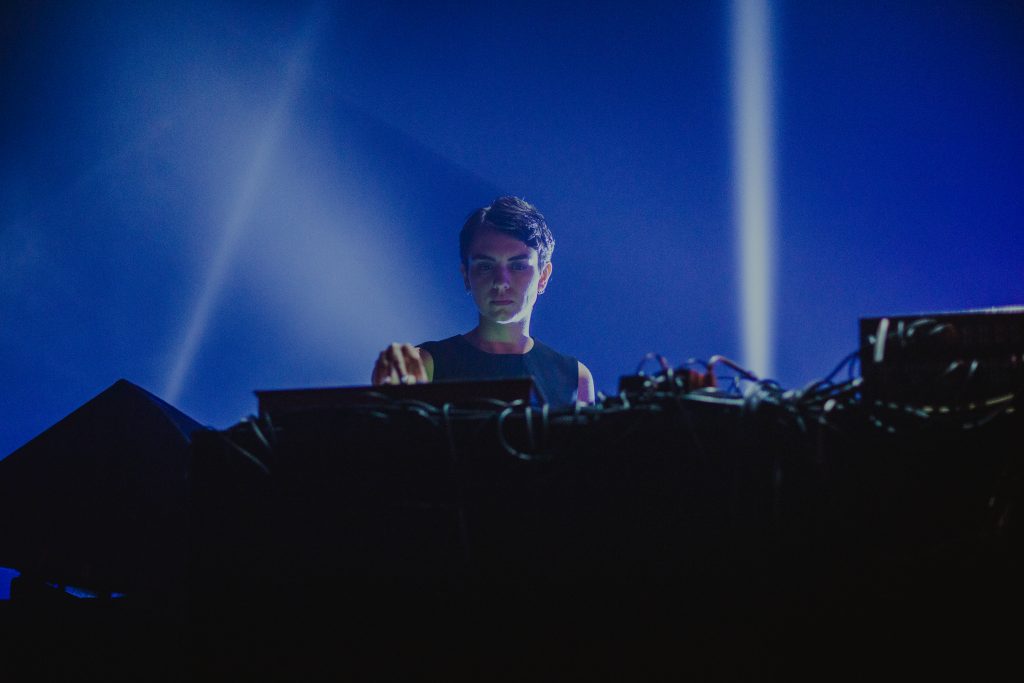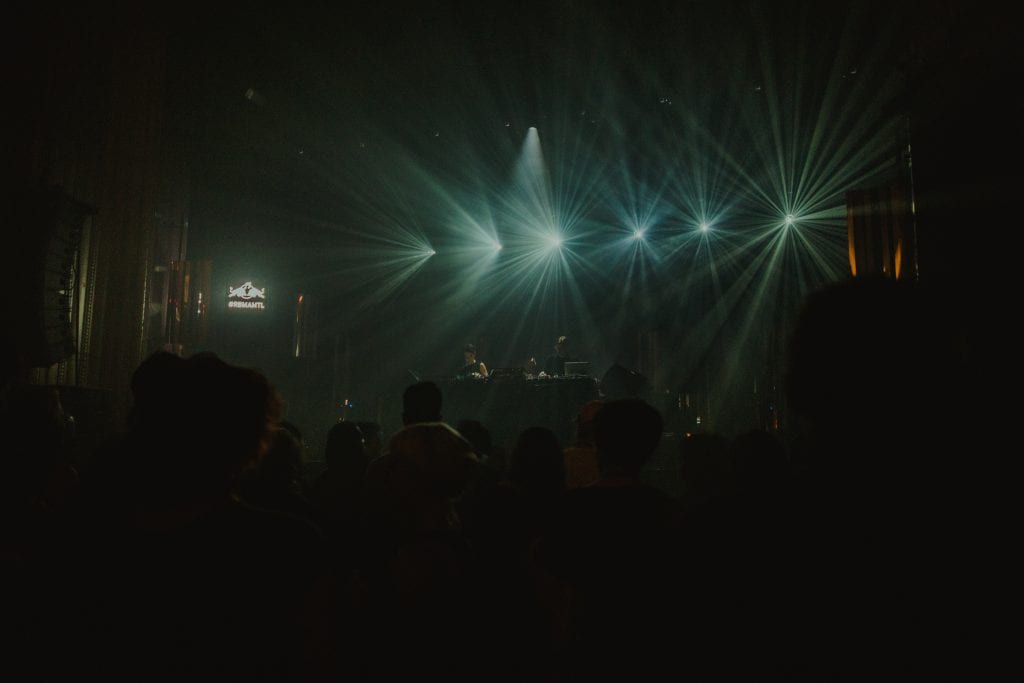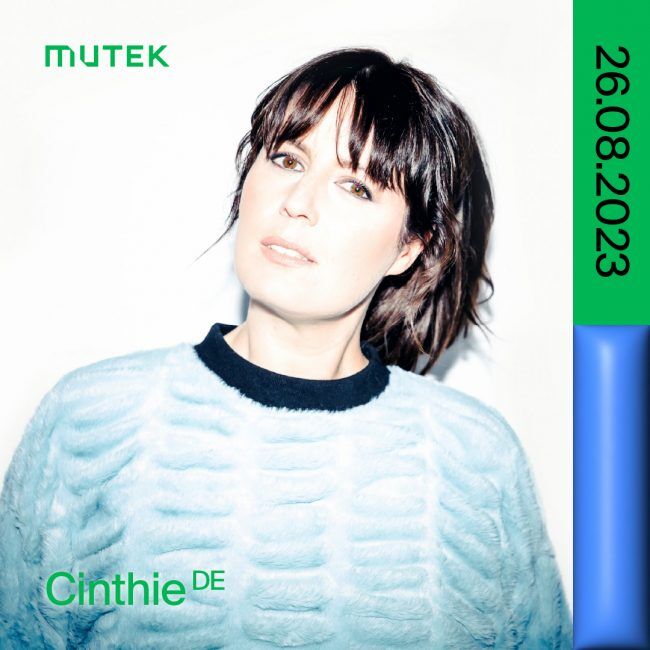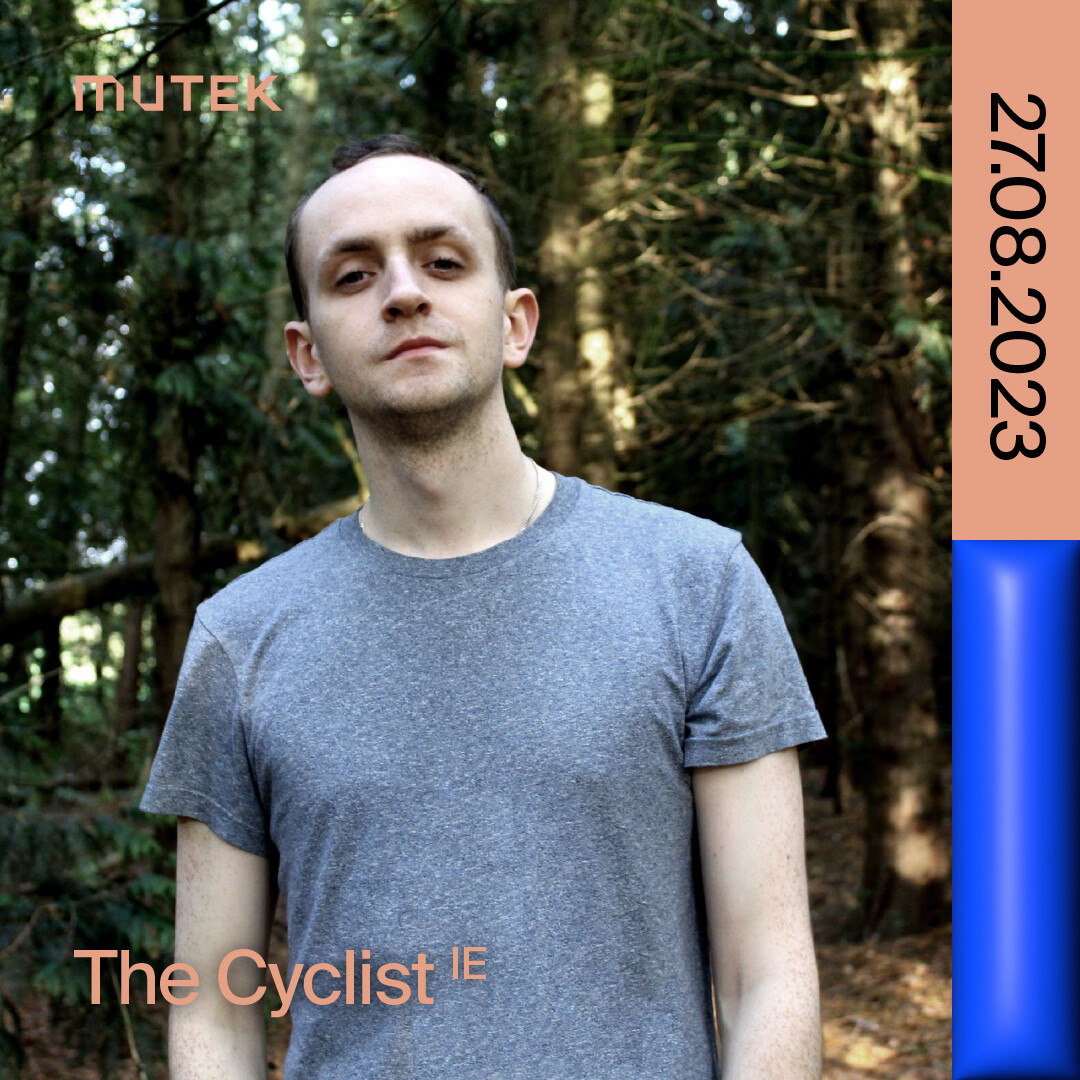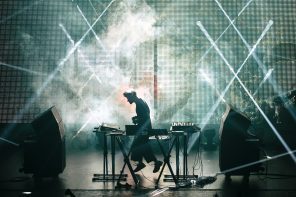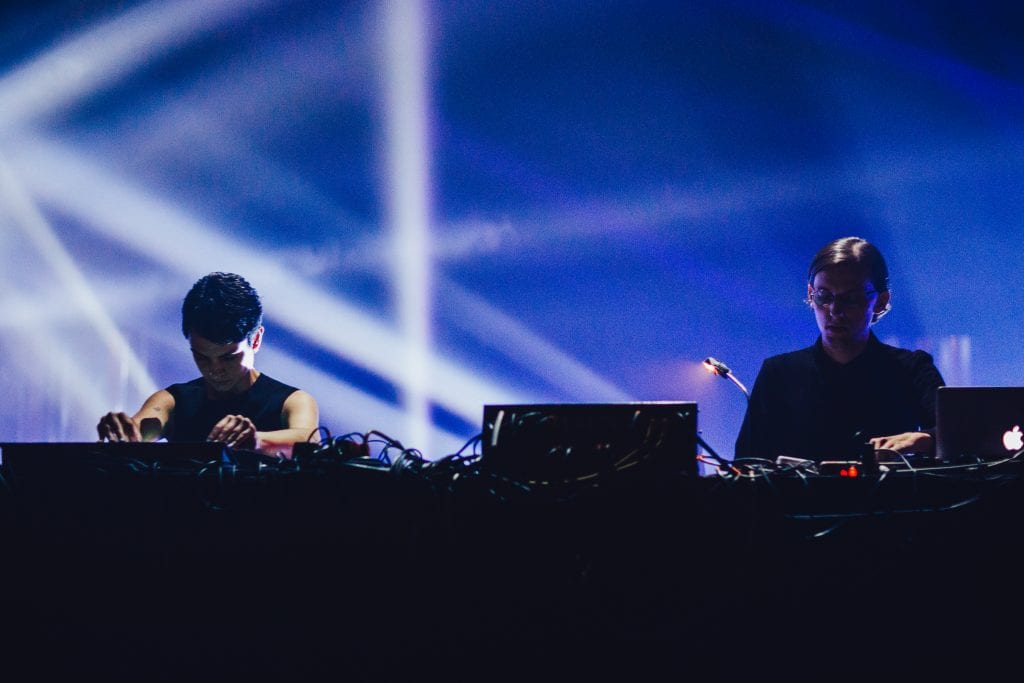
Crédit photo : Ashutosh Gupta
Demora is a new collaboration between two well-known staples of the Montreal underground techno world – Softcoresoft and Devon Hansen (Stefan Jós). The project immaculately combines Devon’s delicate sound programming and astute ear for refinement with Leticia’s rough, raw lively energy and seasoned yet intuitive dancefloor expertise. Although the duo has a debut release forthcoming on Dublin’s First Second Label, their appearance at Mutek made for their highly-anticipated world premiere.
Last Friday, as part of Red Bull Music Academy’s NOCTURE 4: Widescreen Macheen Dreems at Metropolis, we experienced Demora’s distinctive take on driving hardware techno. Their dynamic live set was backboned by a gritty, pulsating bass; it balanced together well-crafted textures animated with vitality and vigour, and carefully fused electro and acid tones with deeper dubby hints.
Not only did the performance set an incredibly high standard for the rest of the well-curated evening, but it made for a formidable testament to Demora’s powerful potential. We were lucky to have had a chat with Leticia and Devon prior to their show with lots of questions about their exciting new collaborative project…
INTERVIEW
Can you tell us a little bit about Demora’s origin story? What spurred you two to decide to start this project together? Did Mutek play any role in its solidification?
Leticia: Actually we met in the Electroacoustics department at Concordia. Devon told me he was working on a project about women in electroacoustic music, so I knew we would get along. That started a friendship, and obviously we were both very interested in music and had our own practices. We’d been jamming sometimes, but at some point we separately got contacted by the same person – Daire Carolan, who runs First Second Label in Dublin and was interested in releasing our individual material – so we thought, why don’t we just do something together? That idea started, and last summer we took a week, booked a studio at Concordia and essentially concretised the EP.
Devon: We sent Mutek the EP recordings and were contacted after that. The festival did solidify the structure of our practice; prior to that, when we recorded the EP was the only time we’d ever really gotten together to make music. The process of preparing for the festival made it more regular, rigorous and formalised.
Leticia: And since preparing a recording and preparing a live set are two different work flows, while we were rehearsing for our set we came up with a lot of new material and modified versions of the tracks we’d already recorded. In the year since the initial recording, our set ups had also developed and our musical practice evolved. The goal of Mutek really made us want to put something together properly, as it’s obviously a great platform to present something new to an audience that is receptive – a great chance to show your best.
And as solo artists, how did you each make your entrances into the music world – was it first via DJing, or did you jump straight into production? How do you think your respective experiences have shaped the way you make music together? And what would you say you each bring to the table in terms of your production processes, the ways you make creative decisions, and the execution of your live show?
Devon: I’ve been producing for a long time but I’m quite new to DJing. When Leticia and I first started, it was more at a DJ capacity playing back-to-back sets together. My background has been very focused on software-heavy production on the computer, whilst Leticia works with all hardware. Because of the individual ways that we’ve come into electronic music, our live set has ended up being a hybrid DJ-style approach with a production sensibility at the same time. This is something that stands out to me about how we work together.
Leticia: Definitely. I’ve had experience as a DJ for longer and more intensely than I’ve had as a producer. My approach to production is often from this DJ mindset of linking elements together and transitioning, bringing in an element and taking something out. When I work with hardware, I work a lot with muting and unmuting, setting up and playing with layers. And I think being attuned to providing a nice narrative arc experience for the crowd is an advantage that comes from listening as a DJ.
Devon: The way we’ve structured our live set too is a bit different from other people I’ve talked to who are doing hardware sets. We made the individual tracks from a production standpoint by jamming them out one by one, and then after they’re finished, we went through a whole other section of preparation figuring out how to transition and mix between essentially these 6 different tracks. But since we’ve made all the layers from scratch, we have the advantage of playing it layer by layer in a semi-improvised way if we wanted to, which you don’t have in a traditional DJ set.
Leticia: That question was also important at a moment when I realised a part of my set-up was inadequate to achieve those seamless transitions. I switched over from writing the bass-lines with Volca Bass to the Minilogue, which is a synth that allows you to save all your patches so you can recall everything as is, so transitioning became much easier, more performative and more track-based.
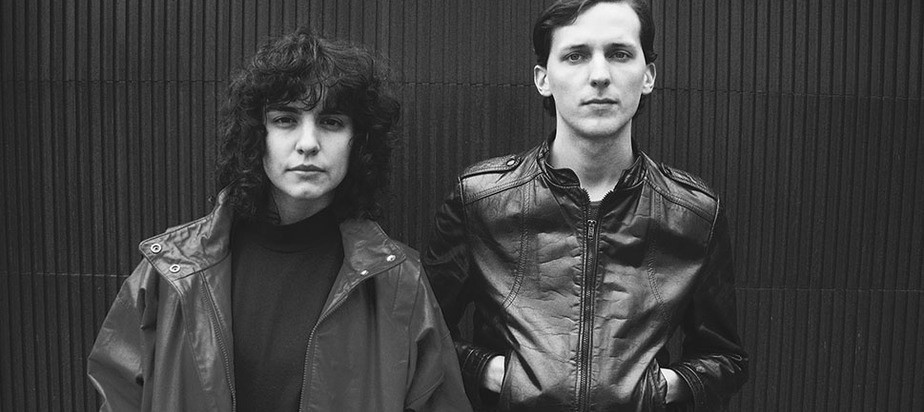
Crédit photo : Anne Bertrand
Did you two have a specific sound in mind that you wanted to try work towards right from the conception of this project, or did ‘Demora’ sort of find itself more naturally via experimentation and jamming together?
Devon: It’s a combination of the two. We’re coming together with our own particular tastes, that happen to be very complimentary and overlap in a lot of areas, but they’re not too similar to the point where our individual work would sound the same as our collaborative work. Our natural approaches to the type of sounds we like and the technical processes we want to explore just happen to mesh together very nicely, and we end up making an interesting mix of things that we may not usually hear in the same place. That’s one of the main reasons why we got along so well in a collaborative level.
Leticia: Even when we were DJing together we got a sense of each other’s tastes, and we realised the evolution of our tastes throughout our friendship was similar. We were thinking about the same ideas at the same time, but from our respective backgrounds. I come from a more super hard techno, EBM, a bit industrial, harsher kind of vibe.
Devon: And I’m a bit softer, in terms of being very sound design focused, spacey, and having weird dub influences as well, which really work in an interesting way with the hardened edge of Leticia’s tendencies.
You’re presenting your work as a duo for the first time EVER on Friday! And on a completely blank palette – no pre-released Demora content to hold by. Do you think that knowing that your world premiere will be made in the very specific context of ‘Mutek’ has shaped the direction of your material? Whether it’s in terms of a consideration for audience expectations at an established festival showcasing ‘digital creativity’ versus, say, at a DIY underground rave; or even in terms of accommodating your sound to the environment you will be performing at… metropolis is a huge space to fill!
Leticia: I’d done maybe 3 or 4 live sets before Mutek, and I was always eager to present work-in-progress that’s still rough around the edges to see how the audience reacts to it. You can afford to be a bit more vulnerable in the context of a DIY show, but this time is too important for me to do that. That really forced a different, less-loose mindset; I want to have everything clear and worked out so that there’s no wild card element to it. Even the word “world premiere” is a pretty heavy tag.
Devon: I’m very grateful to the festival for taking that risk on us, because all we had were those three tracks that we made last summer, which isn’t at all a sure expression of us knowing how to perform a proper live set for a large venue. The context of presenting to a potentially much larger audience than either of us has ever performed for before has definitely concretised our project. If we had have premiered the project at a show with our friends, it would have been a completely different, more improvised, playful approach. It’s clear that the set has been shaped and structured by the incentive of it being the first presentation of our work in a large way and space.
Leticia: And that’s the insight of a seasoned programmer who knows that that’s exactly the effect it’ll have on two emerging artists. That trust is a fantastic gift; it made us work extra hard to take on the responsibility to present our best and not disappoint. We both had the instinct and work ethic to be disciplined and diligent about practicing a lot, as we really wanted to wow people at show-time.
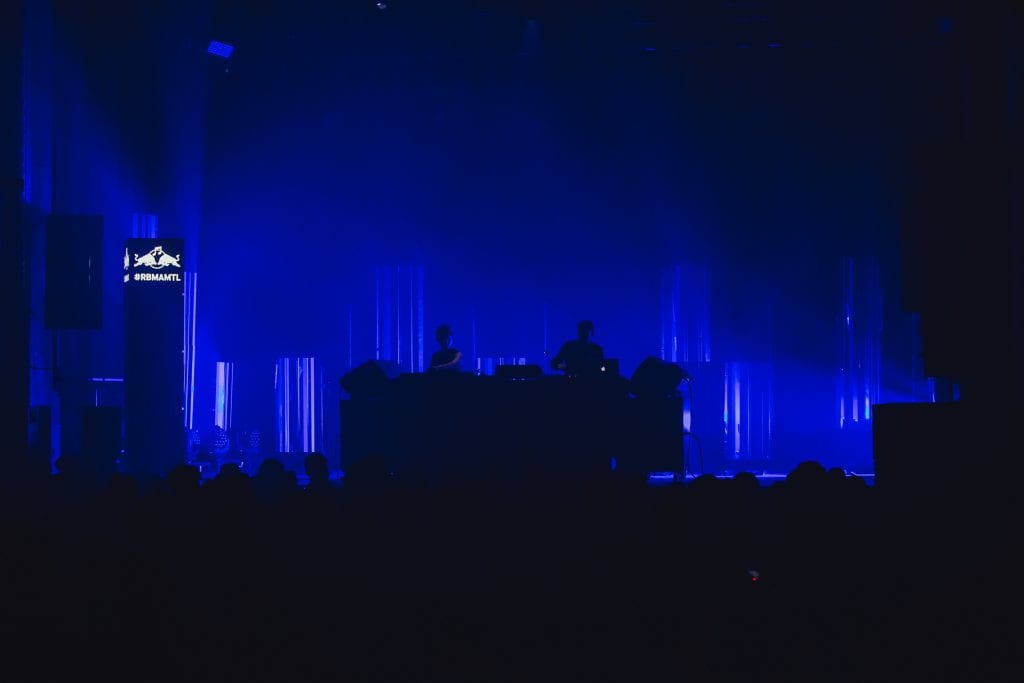
Crédit photo : Ashutosh Gupta
You mentioned you had three tracks for the debut record forthcoming on Dublin’s First Second Label, did your Mutek practice influence or change your view or of those tracks at all?
Devon: The process of preparing the set has very clearly and demonstratively refined our older recorded material from last year. Two of the live set tracks stemmed from being modified versions of the album tracks, and they sound way better now, so we’ll record the new ones after we finish the live set and just swap them out with the old for the EP.
Leticia: Our set-ups have changed pretty majorly since. I personally got much better gear in terms of sequencers, and got to know those tools better, which has allowed me to do more interesting things that I wasn’t able to do before. We’ve also melded our sounds and set-ups – there’s no clear definition between roles, we both do whatever makes sense for us in an organic way.
And because of that, would you consider for your recorded work to have more of a performative focused element in the future?
Devon: Well, our recorded work was very performative as they were built out of layered jams, really, which has always been the case with our project. It wasn’t much of a studio record in terms of composition and its structure; the way the tracks flow feels very loose – but they’re still refined. It’s actually ironic because the festival set sounds more like a structured record than those initial tracks, and that came out of our motivation for a precise performance. I think as we go on, we’ll want to find ways to push those parameters to ride the fence between a jammy improvised style and a more structured style, hovering in the grey area both in the context of performance and recorded work.
You’re both quite involved in and supportive of the Montreal music community: playing DJ sets and live acts from loft parties to the larger Piknic Électronik; putting on events; running an n10.as radio show, Leticia in your case; or collaborating with local artists such as your Fousek/Hansen/Tellier-Craig project, Devon. Do you think Demora reflects in any way the climate and identity of the nightlife and electronic music environment of Montreal? In your opinion, is there a ‘Montreal’ techno sound, and if so, what are some defining characteristics?
Leticia: I think by osmosis I’ve absorbed the ethos that’s been around this… second or third techno wave in Montreal. Obviously there’s a heritage of rave scenes and techno enthusiasts since the mid-90s, but the current iteration in the Montreal queer techno scene – made up of central parties organised by Frankie Teardrop, LIP, Slut Island, Catherine Colas, J’vlyn D’Ark – is the one out of which I came. I mean we all came from very different places, but it’s a very connected world and my interests in electronic music evolved over those two years to reflect this. It’s interesting because I was never a basement DJ; my trajectory since day one has been that of playing out in public to a present crowd. Because of that, I’ve always been curious in what’s going on in the local scene, but I still very much know my tastes and have a certain confidence to deliver them. The interaction of seeing how people react to them has nonetheless shaped my sets and my sound.
The Montreal sound, yes there’s definitely a few people interested in the same kinds of sounds. Montreal has a really important noise and punk scene, and people coming from those making techno gives a rougher effect, and it’s EBM all of a sudden. There’s never really a clear lineage though, everything happens at once and everyone shares mixing styles.
Devon: The thing that I like about Montreal is there isn’t necessarily a Montreal sound. In the past 5 years or so, it’s been quite a mixed bag. People are encouraged to – and feel comfortable with – doing their own thing, something that they connect to on a personal level. People who run events have so much to choose from; you could program a DIY event that would have a techno leading act, an ambient set, dancehall, someone playing a saxophone through a modular… that’s why I love it here so much. I think Montreal’s strength is its plurality for sure. And that influences the way we make music together, because we’re always pulling from different stylistic contexts and finding ways to integrate them.
Leticia: There’s less of a techno intelligencia; Montreal’s a bit looser, people are not oppressed by musical trends unlike some other cities where you may have to play the ‘cool’ thing to be able to have gigs. That’s very freeing and liberating, and people are willing to listen to such disparate things in the same night.
You mentioned you both studied electroacoustics in university. Has your institutionalised studies in this discipline shaped the way you view and approach electronic music, and do you think there is an integration or even a disconnect between the commonly perceived understandings of ‘electroacoustic’ or ‘sound art’ music compared to that of the seemingly more accessible ‘dance’ music?
Leticia: I was studying sound from a ‘sound studies’ perspective, which is very different from an electroacoustic background – it’s an interest in the political, gendered, artistic, and historical aspects of anything that makes sound, really. Cultural studies is possibly one of the first academic disciplines where dance music and rave culture has been studied with a certain amount of attention and seriousness; it was an opportunity for me to read academic papers about raves just as I was starting to DJ and getting into dance music. I took a few classes in the electroacoustics department as I was missing a more technical aspect. It’s interesting the way in which people who went through that department go into all sorts of directions – electroacoustics is not what they necessarily identify as. I met Devon and I think we bonded as we both had a critical eye of this institutionalised, academic lens to music and how it affects the practice.
Devon: In electroacoustics, it’s pretty common to meet people who are DJs while undertaking their academic studies. In this city especially, you’ll meet someone who has a pretty developed DJ practice and a wide-ranging knowledge of both dance music and experimental, academic-lineage music. Sometimes that leaks into their production style, but more often I find there is an openness built into how people develop their DJ styles and mixing. Because you’re constantly engaging with two very disparate worlds of music all the time and flexing this diversity muscle in your brain, you’re a lot less likely to stay too rigorously within one style, and a lot more open to looking at weird dance music leaning towards electroacoustic music.
Do you reckon that your collaboration together as Demora has altered your approach in your respective solo works and other collaborations, or do you tend to compartmentalise your various projects?
Leticia: I’ve definitely learned a lot from Devon – from his sound design inclinations, which are very strong, and his stylistic influences. This workflow of putting a specific set together, even listening to and refining things together has been very positive. Working together has been very formative because I think we do have a very nice collaborative vibe; we respect each other as people and as creators.
Devon: I’ve always been very production focussed, so prior to our working on this project I was feeling very cautious and reluctant about live performance, especially as I was starting to get comfortable with DJing. However, I think working together we understand we both have similar impulses so it’s been a lot easier for us to trust each other in performance. I’m definitely more willing and able now to take risks and step outside of my comfort zone, as well as collaborate with other people, because prior to this – with the exception of one other project – I didn’t really have much of a history in collaboration. Also, I was much more intensely incentivised by this collaborative dynamic to go into the studio and spend hours working and now it’s really paid off. We both enable time management, self-discipline and better communication in each other.
Leticia: It’s a funny dynamic – you collaborate, you create something together, but there are some certain impulses that we each have that’ll fit better into our solo practices, so it just generates more creativity and more ideas.
Apart from the upcoming record, where is Demora headed post-Mutek? Any grand plans?
Devon: First we’ll take a little breather… but all kinds of weird little ideas have been coming up once we were confident in our set. We started thinking about how we can mix it up and build a new approach, maybe figure out an improvised set-up for a more loose, jam-based performance, or getting better at DJing together as a back-to-back.
Leticia: We take this as an opportunity just to see what our collaboration yields, whether that’s a hardware techno set, or an ambient set… we’re finding that we have a lot of different ideas that come up just from spending time together, we’ll take it day by day.
Lastly, any hot tips for Mutek? Can you please recommend for us a few artists that we must not miss?
Both: rRoxymore for sure. Ouri. Dis Fig. Buffalo MRI, Dom is a really good friend of ours, her sets are always excellent so that’s a big priority. I really want to see Beatrice Dillon’s live set, but she’s playing the same time as us. I’d definitely recommend seeing Space Afrika. Pelada, they’re key to the Montreal underground. Fis is a very exciting project that I don’t think has ever come to Montreal.
Leticia: And the cool thing with Mutek is that you end up discovering a bunch of incredible stuff that you didn’t expect. It’s fun to hop around and do as much as possible. The local presence this year is a really positive thing for Montreal.
Maria Wang

